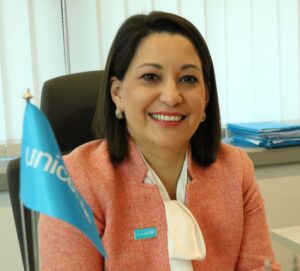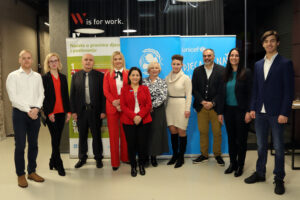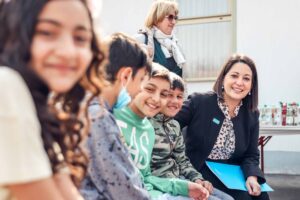UNICEF works in the world’s toughest places to reach the most disadvantaged children and adolescents – and to protect the rights of every child, everywhere.
UNICEF works in the world’s toughest places to reach the most disadvantaged children and adolescents – and to protect the rights of every child, everywhere. Through its work in 190+ countries, and has the ability to shape governments’ policies, reach the most remote places, and deliver emergency supplies anywhere on Earth within 48 hours. We do whatever it takes to help children survive, thrive, and fulfill their potential, from early childhood through adolescence. Globally and in Croatia, UNICEF’s goal is to ensure that every child realizes his/her rights to health care, protection, participation and education. We are here to support children especially the most disadvantaged ones, Regina M. Castillo, Representative of the UNICEF Office for Croatia, told Diplomacy and Commerce.

Castillo grew up in Nicaragua, completed her university studies in the United States, and worked in the Executive Office of UN Secretary-General Kofi Annan as an Economic Affairs Officer and at the UNAIDS, UN agency based in Switzerland that fights the HIV/AIDS pandemic, as well as in Peru, Bolivia, and Ecuador. She first started working for UNICEF as Representative in Paraguay, and for the last five years, she has been leading the UNICEF Office for Croatia. In every country, UNICEF, in cooperation with the Government, agrees on the most important goals for children. Subsequently, through five-year program periods and together with numerous partners – relevant state institutions, the non-governmental sector, and the business sector – we work to fulfill the goals important for children and youth in the country, explained Castillo.
- The world is rapidly changing nowadays, can you share some of the programs and good practices that contribute to the fulfillment of children’s rights in Croatia?
UNICEF’s focus in Croatia is on the most vulnerable children – children with disabilities, children growing up without adequate parental care, children from minority groups, and children at risk of poverty and exclusion.
This includes programs for children with disabilities like “Communication for Every Child”, for those who have trouble expressing themselves, and for children’s participation during treatment or hospitalization, as well as programs aimed at ensuring that babies have the best start in life (such as the certification of all baby-friendly hospitals in Croatia and the establishment of the Human Milk Bank).
While much of our work involves infants and small children, our focus has recently also been on adolescents who do not always receive the same attention and care as small children but need support. Through special youth programs such as the platform “ZABUM! – Za budućnost mladih!”, “Schools of Support”, and the program implemented by the Croatian Institute of Public Health “PoMoZi Da”, we are addressing mental health topics and the participation of children and young people in meaningful learning, while also empowering them with 21st-century skills. For years, we have been working on the development of media literacy skills for parents, teachers, and, of course, children and young people through the medijskapismenost.hr portal and Media Literacy Days.
In cooperation with and funded by the European Union, UNICEF implemented a pilot program “Phase III: Testing the Child Guarantee in Croatia” in Međimurje County with the aim of breaking the poverty cycle for the most vulnerable children, such as children with disabilities, children growing up in difficult conditions, and children from national minorities. I believe that the experiences from Međimurje will be recognized at the national and European level as an example of quality intersectoral cooperation that has ensured successful results for the well-being of children and their families.
2. How important is cooperation with partners who share a common vision of creating a better future for children?
In the implementation of planned program activities, UNICEF recognizes the support of the business sector, NGOs, state institutions, celebrities, experts, and volunteers aimed at achieving systematic change and lasting positive results for the well-being of children.
For the last 8 years, the number of our partners has been growing exponentially. When I look to the future, I see a wealth of opportunities, especially when it comes to partnering with the business sector to enhance children’s rights. Why the business sector? At UNICEF, we know that companies bring so much more to the table than financial resources. The business sector can contribute with research, distribution expertise, supply chain management, business networks, market leverage, and technical expertise – all areas through which companies can have a strong impact on children’s rights.

Photo:Siniša Sunara_UNICEF
3. Do you see any new trends when it comes to cooperation with the business sector, or in the way business leaders look at the impact they have on society changing?
We are witnessing that companies no longer see sustainable business practices as a choice but as an integral and long-term part of their business strategy. In 2016, when UNICEF began to cooperate more intensively with the business sector on strengthening corporate responsibility (including children’s rights), it was evident that companies were mostly unaware of how they could affect children and their rights (except when it came to the child labor issue), or what that influence means for the business sector as a whole. Our goal is to make companies aware that placing children’s rights at the very center of sustainable development and responsible business behavior is necessary for solving the challenges we are facing today as a society, as well as achieving better business results.
4. What are UNICEF’s key business-oriented initiatives?
UNICEF has developed the CSR Academy in Croatia to help businesses from all industries (up to this point, there have been more than 130 participants from 90 different companies) to expand their knowledge of the companies’ impact on children’s rights (following a due diligence process which helps assess their impacts on children and report them in the ESG reports). However, we are aware that education alone is not enough and that it is crucial to reach decision-makers in companies and organizations and that’s why we’ve gathered many relevant stakeholders (high-level representatives from business organizations and companies, academia, and young people) in the Advisory Body on Children’s Rights and Corporate Social Responsibility. Together, we work on many exciting initiatives that promote the best standards when it comes to addressing children’s rights in the business sector in Croatia. In addition, we have launched parenting programs for employees of Croatian companies aimed at enabling a family-friendly workplace environment and supporting working parents in giving their children the best start in life.
5. How can we all join in and help create more beautiful stories for children and their families?
As a self-funded office, UNICEF in Croatia has a special relationship with its donors and supporters, with their feedback and support making our programs better and more relevant. Croatians are both loyal and generous. I find the generosity of Croatian people extraordinary – 3 percent of the total Croatian population regularly supports UNICEF. The implementation of our activities would not be possible without the support from citizens and companies that have placed the focus of their CSR activities precisely on children. We especially value the support from our Childhood Guardians and donors who support our work with regular monthly donations which allow us to conduct our programs for boys and girls, as well as react quickly in crisis situations in Croatia. And despite some very real crises lately – the pandemic, the wars, and climate disasters – partnerships with UNICEF can, and do, shape the future for the better.

6. What do you think additional efforts are to be invested in, or what do children need most today?
Our task is to ensure that all children – regardless of who they are, who their parents are, and where they live – have the opportunity to live up to their full potential. Childhood obesity has grown into a global epidemic and represents a major challenge for public health, and 35% of children aged 8-9 in Croatia are overweight. We are contributing to the National Action Plan for Obesity Prevention and creating new coalitions and programmes to promote healthy habits, help prevent obesity and improve the nutrition literacy of children, parents and caregivers. Moreover, we continue to work more systematically to enable the best possible safeguarding for children without adequate parental care and support families at risk. We will continue cooperation in the areas of education and youth skill building, ensure pathways for young people to be more effective champions when it comes to climate change and sustainability topics, and foster meaningful engagement of young people in decision-making processes to enhance efforts to respect, promote, and consider the rights of children and young people.